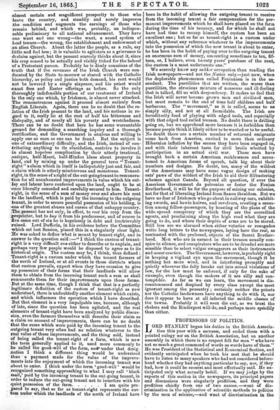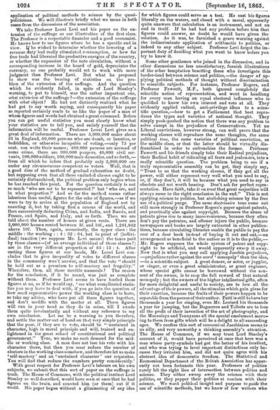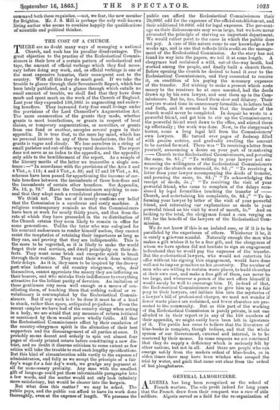PROFESSORS OF POLITICS. application of.political methods to science by the
quasi- pelitieians. We will illustrate briefly what we mean in both oases from the discussions of the association.
We take Professor Leoni Levi and his paper on the ex- - tension of the suffrage as our illustration of the first class. The Professor is a respectable financier and a good economist. He knows how to use figures where he has a specific end in view. If he wished to determine whether the lowering of a revenue duty had really stimulated consumption, or how far free trade had liberated the productive energies of the country, or whether the expansion of the note circulation, without a corresponding increase in the hoard of gold, depreciates the currency, no one probably would set to work with more judgment than Professor Levi. But what he proposed to show was the bearing of statistics on the pro- blem of the extension of the suffrage. And the question which he evidently failed, in spite of Lord Stanley's warning, to put to himself, was the rather important one, what extension of the suffrage ?—the extension of the suffrage with what object? He had not distinctly realized what he had got to say worth saying, and consequently his paper as reported certainly reads to us like the paper of a man of whom figures and words had obtained a great command. Before you can get useful statistics you must clearly know what your statistics are to tell you, and satisfy yourself that the information will be useful. Professor Leoni Levi gives us a great deal of information. There are 5,000,000 males about 21 in England, 50,000 persons who are dumb, or lunatics, or bedridden, or otherwise incapable of voting,—only 75 per cent. can write their names; 469,000 persons are accused of some crime, there are 900,000 paupers, 40,000 civil ser- vants, 100,000 soldiers, 100,000 male domestics, and so forth, — from all which he infers that probably only 3,000,000 are under any circumstances competent as voters. Well, that is a good dose of the method of gradual exhaustion no doubt, but supposing even that all these excluded classes ought to be certainly disfranchised, the political problem only begins when he has reached this point. For the question certainly is not so much ' wbo are not to be represented ?' but who are, and in what proportion ?' And so far the method seems rather laborious than useful, figures forthe sake of figures,—as if we were to try to arrive at the population of England not by counting it, but by taking first a census of the world, and then successively deducting China, and India, and Russia, and France, and Spain, and Italy, and so forth. Then we are told about the number of houses at given rents. There are 2,000,000 houses rented between 31. and 101., and 1,281,842 above 101. Then, again, numerically, the upper class : the middle : the working : : 4 : 32 : 64, but in point of (indivi- dual) taxation (we suppose Mr. Levi means) the taxes paid by those classes—(of an average individual of those classes ?) are in the very different proportion of 83 : 13 : 4. After casting these figures at our heads, Mr. Leoni Levi con- cludes that to give inequality of votes to different classes in the community won't answer, and that the vote " should be held out as a premium to self-mastery and frugality." Wherefore, then, all those terrible numerals ? The reason for the conclusion, if it be sound, was just as complete without them. Professor Levi seems to hare hurled these figures at us, as if he would say, ' see what complicated statis- tics you may have to deal with, if you go into the question of how much representative power the working class is to have, so take my advice, who have put all these figures together, and don't meddle with the matter at all. These figures will run in your head as they do in mine, till I exude them quite involuntarily and without any reference to my own conclusion. Let me be a warning to you therefore, and settle the matter out of hand on that very simple principle that the poor, if they are to vote, should be " unstained in character, high in moral principle and will, trained and en- lightened the great school of constitutional and political government." True, we make no such demand for the mid- dle or working class. A man does not lose his vote with his character there, but then you must reduce the number of electors in the working class somehow, and therefore let us make 'self-mastery' and an unstained character' our requisites. You will find that reduce the numbers pretty considerably.'
With great respect for Professor Levi's labours on his own subjects, we submit that this sort of paper on the suffrage is trash. The House of Commons, with the political instinct Lord Stanley so well described, would have seen at once that he had figures on the brain, and counted him (or them) out if it could. His paper began without a glimmering of any idea for which figures could serve as a test. He cast his figures liberally on the waters, and closed with a moral, apparently quite unaware that calculation is an instrument, and not an end in itself. If he had had any problem before him that figures could answer, no doubt he would have given the solution. As it was, he furnished a grave warning against the indiscriminate application of arithmetic to politics, or indeed to any other subject. Professor Levi forgot the im- portant duty of deciding what you want to know before you try to know it.
Some other gentlemen who joined in the discussion, and in other discussions no less unsatisfactory, furnish illustrations of the other temptation besetting those who investigate this border-land between science and politics,—the danger of ap- plying political methods of thought without discrimination to scientific subjects. For instance, Professor Rogers, and Professor Fawcett, M.P., both ignored completely the- scientific notion of representation, and went in headlong for every man having an equal electoral influence who is- qualified to know his own interest and vote at all. They evidently applied radical, anti-privilege ideas to a scien- tific question,—bow to get a Parliament that best repro- duces the types and varieties of natioual thought. They simply pooh-poohed the notion that there was any problem to except in the prejudices of Conservatives. Yet no Liberal convictions, however strong, can well prove that the working classes will reproduce the same thoughts, the same- political tone, the same varieties of political conviction, as the middle class, or that the latter should be virtually dis- franchised in order to enfranchise the former. Professor Fawcett and his friends simply take their Radical prejudices, their Radical habit of ridiculing all fears and jealousies, into a really scientific question. The problem being to see if a truly representative assembly can be got, they simply say, "Trust to us that the working classes, if they got all the power, will either represent very well what you used to say, or, if they don't, it will be because what you used to say is- obsolete and not worth hearing. Don't ask for perfect repre- sentation. Have faith, take it on trust that great majorities will always come to the right conclusion in the end." This is not applying science to politics, but abolishing science 'by the free use of a political purge. The same doctrinaire tone came out still more strongly in Professor Rogers's paper against pateots, and practically also against copyright. Because the abuse of patents gives rise to many inconveniences, because they often don't pay the patentee, and oftener injure the public, because- newspapers and books are largely extracted in other publica- tions, because circulating libraries enable the public to pay the rent of a dear book instead of buying it out and out,—an arrangement as beneficial to the author as it is to the public,— Mr. Rogers supposes the whole system of patent and copy- right to be artificial, and would apparently sweep it away.. Now that is what you may call applying Jacobin prejudices,. —prejudices rather against the word monopoly' than the idea, —to a scientific subject. A great dancer, or actor, or juggler, or singer, or even a great administrator, or great engineer, whose special gifts cannot be borrowed without the con- sent of the owner, is to reap the full reward of that natural monopoly ; but the owners of the higher intellectual gifts, often far more delightful and useful to society, are to lose all the- advantage of their powers, all the stimulus which gain gives for their exertion, because the fruits of their powers happen to be separable from the person of their author. Patti is still to have her thousands a year for singing, even Mr. Leotard his thousands a year for jumping, but the Daguerres and Talbots are to lose all the profit of their invention of the art of photography, and the Macaulays and Tennysons all the special emolument accru- ing to them from gifts which will be a delight to all succeeding ages. We confess this sort of economical Jacobinism seems to us silly, and very unworthy a thinking assembly's attention. The House of Commons, if we may trust Lord Stanley's account of it, would have perceived at once that here was a man whose party-symbols had got the better of his intellect, and who was trying to level important distinctions only be- cause they irritated him, and did not quite agree with his abstract idea of democratic freedom. The Statistical and Economical Department of the British Association has appar- ently not been fortunate this year. Professors of politics rarely hit the right line of intersection between politics and science. They either sweep away the science with their politics, or they pepper their politics at random with their science. We want political insight and purpose to guide the use of scientific methods, but we know of few writers who
command both these requisites, —not, we fear, the new member for Brighton. Mr. J. S. dill is perhaps the only well-known living author who seems to combine happily the qualifications of scientific and political thinker.
































 Previous page
Previous page